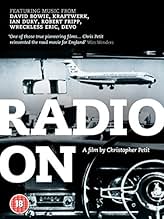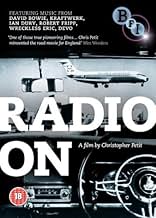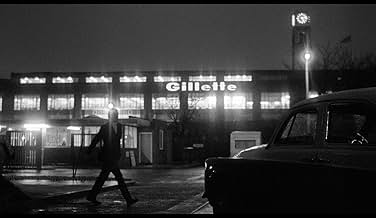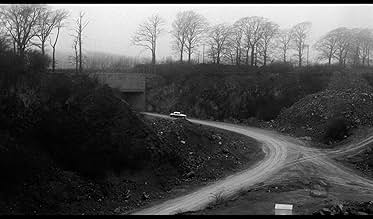Radio On
- 1979
- 1h 44m
IMDb RATING
6.5/10
1.3K
YOUR RATING
In 1970s Britain, a man drives from London to Bristol to investigate his brother's death, and the purpose of his trip is offset by his encounters with a series of odd people.In 1970s Britain, a man drives from London to Bristol to investigate his brother's death, and the purpose of his trip is offset by his encounters with a series of odd people.In 1970s Britain, a man drives from London to Bristol to investigate his brother's death, and the purpose of his trip is offset by his encounters with a series of odd people.
- Awards
- 1 win & 1 nomination total
Featured reviews
A radio DJ drives from London to Bristol to investigate the death of his brother. Along the way he encounters some odd people and listens to some pretty cool music. Former film critic Christopher Petit crafts a very deliberate homage to the early films of Wim Wenders (who was a producer), even using Wenders's cinematographer and actress Lisa Kreuzer (who may even be reprising her role from "Alice in the Cities"). This is a very slow and uneventful film, but if you appreciate Wenders's existential road films, you should love this one. Sting's debut role here is the best role he ever had as a fanatical Eddie Cochran fan. David Bowie, Kraftwerk, Ian Dury and Wreckless Eric are all featured on the soundtrack.
Opening scene: like a badly lit YouTube video with camera tracking around a dingy flat in the dark.
A lot of dinge. Silences devoid of talking but staring from back of head off out into alienated nowheres.
Perpetual gloom is hungover every scene. This is England of 1979. Looking as bleak and despondent as I remember it. Thatcher the milk-snatcher had just come to power.
Not just dark and dim, but dull the first time i saw it. The plot is minimal and pointless (i.e beside the point) Concerned more with observational detachment than motivational character development. It's got a morose London Dj driving his Rover past monolithic tower-blocks out towards the desolate west country. Listening to Kraftwerk tapes sent by dead brother.
Dj like an alienated mopey nobody passively drifts into and out of various encounters of estrangement with other alienated mopey no-bodies (Sting still tries to be Sting though as a solitary and subdued petrol attendant singing Eddie Cochran on guitar).
This is Wim Wenders country. The existential road movie switched from soul-less autobahn to empty A4. Wenders cinematographer (Martin Schafer) is doing all the b/w monochrome melancholy with the camera. Even got Liza Kreuzer from Alice in the Cities looking for her daughter Alice (from Alice in the Cities?). Maybe she's in Weston-Super-Mare. Lets go there.
This has become a cult film. Critics liked it because it tried to be different, i.e the same as their beloved Wim. A cool German art-house sensibility transplanted to 1970′s England. Makes it feel like a depressingly depressive place. Even more depressingly depressive than it is now.
A lot of dinge. Silences devoid of talking but staring from back of head off out into alienated nowheres.
Perpetual gloom is hungover every scene. This is England of 1979. Looking as bleak and despondent as I remember it. Thatcher the milk-snatcher had just come to power.
Not just dark and dim, but dull the first time i saw it. The plot is minimal and pointless (i.e beside the point) Concerned more with observational detachment than motivational character development. It's got a morose London Dj driving his Rover past monolithic tower-blocks out towards the desolate west country. Listening to Kraftwerk tapes sent by dead brother.
Dj like an alienated mopey nobody passively drifts into and out of various encounters of estrangement with other alienated mopey no-bodies (Sting still tries to be Sting though as a solitary and subdued petrol attendant singing Eddie Cochran on guitar).
This is Wim Wenders country. The existential road movie switched from soul-less autobahn to empty A4. Wenders cinematographer (Martin Schafer) is doing all the b/w monochrome melancholy with the camera. Even got Liza Kreuzer from Alice in the Cities looking for her daughter Alice (from Alice in the Cities?). Maybe she's in Weston-Super-Mare. Lets go there.
This has become a cult film. Critics liked it because it tried to be different, i.e the same as their beloved Wim. A cool German art-house sensibility transplanted to 1970′s England. Makes it feel like a depressingly depressive place. Even more depressingly depressive than it is now.
Filmed in black and white with some great imagery; I love how this film looks with its art-house styling. There is a pretty good soundtrack with songs from the likes of David Bowie, Ian Dury, Kraftwerk and Devo
amongst others. All the performances were good but all delivered in a very 'matter of fact' manner. David Beames took centre stage as Robert with Lisa Kreuzer playing Ingrid. Sandy Ratcliff was Kathy and Andrew Byatt the Deserter but (for me) the star turn was a brief cameo from Sting as the Eddie Cochrane loving petrol pump attendant.
I must admit I was somewhat disappointed by this film. I expected a little more focus on the music for one thing and the fact that everyone in Bristol seemed to speak with a London accent didn't help! It has a very slow pace which I was prepared to accept as long as something happened. Sadly, apart from one bright sequence featuring Sting, not a lot seemed to. There are also sequences where the majority of the dialogue is in German, with no subtitles; very odd! I will give the filmmakers credit for some excellent imagery showing just how bleak an English winter can be (even in the South). Over all I'd say one for lovers of art-house films for them, Recommended for the general cinebuff maybe not.
My Score 6.4/10
IMDb Score: 6.3/10 (based on 296 votes at the time of going to press).
MetaScore: NO DATA: (Based on 0 critic reviews provided by Metacritic.com at the time of going to press).
Rotten Tomatoes 'Tomatometer' Score: NO DATA (based on 0 reviews counted at the time of going to press).
Rotten Tomatoes 'Audience' Score: 12/100 'Want to See' (based on 625 user ratings counted at the time of going to press).
You can find an expanded version of this review on my blog: Thoughts of a SteelMonster.
I must admit I was somewhat disappointed by this film. I expected a little more focus on the music for one thing and the fact that everyone in Bristol seemed to speak with a London accent didn't help! It has a very slow pace which I was prepared to accept as long as something happened. Sadly, apart from one bright sequence featuring Sting, not a lot seemed to. There are also sequences where the majority of the dialogue is in German, with no subtitles; very odd! I will give the filmmakers credit for some excellent imagery showing just how bleak an English winter can be (even in the South). Over all I'd say one for lovers of art-house films for them, Recommended for the general cinebuff maybe not.
My Score 6.4/10
IMDb Score: 6.3/10 (based on 296 votes at the time of going to press).
MetaScore: NO DATA: (Based on 0 critic reviews provided by Metacritic.com at the time of going to press).
Rotten Tomatoes 'Tomatometer' Score: NO DATA (based on 0 reviews counted at the time of going to press).
Rotten Tomatoes 'Audience' Score: 12/100 'Want to See' (based on 625 user ratings counted at the time of going to press).
You can find an expanded version of this review on my blog: Thoughts of a SteelMonster.
came across this database entry by accident. saw the movie 25 years ago and still can find its traces in my memory - amongst these the strongest when Robert and a hitchhiker drive along a forest of power line pylons and find them awful. Robert says something like "years from now when only a few of them are left we might say they're beautiful" (sorry, a 25 year old memory is not the best base for correct quoting) Christopher Petits influences of the early Wim Wenders road movies can be traced down best in " I'm Laufe der Zeit (Kings of the Road) " from 1976 - its in b/ w as well. But to me there is as well a link to Jarmush's " Stranger than Paradise " from 1984 (more acting and dialogs but the same slow glide thru scenic black& white landscapes)
As enigmatic as its title, Chris Petit's debut film is interesting visually, but less so in other respects, particularly narrative drive and character depth. To be perfectly honest, it starts slowly and decelerates from there, with David Beames' disillusioned disc-jockey setting out to ostensibly look into the death (in his own bath) of his brother. Along the way he encounters obsessive individuals like an unhinged Scottish army deserter, an Eddie Cochran-obsessed garage attendant and a young German woman trying to track down her daughter.
More than likely the film is working at allegorical and symbolic levels I couldn't comprehend, although I did recognise the bleakness of the environment depicted here, having lived through the period as a young adult in Glasgow. I wasn't surprised to see Wim Wenders' name on the production credits, so terribly slow is the I hesitate to call it action, the longueurs broken most frequently by music from the contemporary post-industrial music scene, including tracks by Kraftwerk, Bowie and Fripp amongst others. In fact the music is so dominant at times, you might think the film is the visual accompaniment to its own soundtrack, rather than the other way round.
It's all very stilted and boring however. Some humour might have helped a bit or even some sort of dramatic climax, but I gave up on that hope quite early. As a snapshot of this country suffering economic hardship in a bleak post-industrial wasteland (no change there, then), I just about got Beames aimless and listless drifting as a metaphor for the frustrated youth of the time, distrusting authority, travelling without moving as the saying goes.
Eventually he literally moves to the edge as he ends up on the edge of a precipice, in actuality a disused quarry but by then I had tired of the film's general inaction, dull characterisations, flat dialogue and obscure locations. The camera lingers on and on long after a scene has ended, and what I presume are supposed to be meaningful silences are in the end just awkward pauses.
The Britain of the early Thatcher government was like this visually, grey, cold bleak and pretty hopeless. I'm not quite sure however what I was meant to derive from the main character's "journey", even if in truth he seemed to be on a road to nowhere. I could see cultural cross-references to the music of the day (The Specials "Ghost Town" from a year later would have fitted the soundtrack very well) and also the photography of Anton Corbijn (best known for his work with U2 and Depeche Mode), but as a bona-fide movie though, I didn't get its vaguely film-noir meets urban decay aspiration and might have wished I'd put on a few Bowie and Kraftwerk albums to pass the time instead.
More than likely the film is working at allegorical and symbolic levels I couldn't comprehend, although I did recognise the bleakness of the environment depicted here, having lived through the period as a young adult in Glasgow. I wasn't surprised to see Wim Wenders' name on the production credits, so terribly slow is the I hesitate to call it action, the longueurs broken most frequently by music from the contemporary post-industrial music scene, including tracks by Kraftwerk, Bowie and Fripp amongst others. In fact the music is so dominant at times, you might think the film is the visual accompaniment to its own soundtrack, rather than the other way round.
It's all very stilted and boring however. Some humour might have helped a bit or even some sort of dramatic climax, but I gave up on that hope quite early. As a snapshot of this country suffering economic hardship in a bleak post-industrial wasteland (no change there, then), I just about got Beames aimless and listless drifting as a metaphor for the frustrated youth of the time, distrusting authority, travelling without moving as the saying goes.
Eventually he literally moves to the edge as he ends up on the edge of a precipice, in actuality a disused quarry but by then I had tired of the film's general inaction, dull characterisations, flat dialogue and obscure locations. The camera lingers on and on long after a scene has ended, and what I presume are supposed to be meaningful silences are in the end just awkward pauses.
The Britain of the early Thatcher government was like this visually, grey, cold bleak and pretty hopeless. I'm not quite sure however what I was meant to derive from the main character's "journey", even if in truth he seemed to be on a road to nowhere. I could see cultural cross-references to the music of the day (The Specials "Ghost Town" from a year later would have fitted the soundtrack very well) and also the photography of Anton Corbijn (best known for his work with U2 and Depeche Mode), but as a bona-fide movie though, I didn't get its vaguely film-noir meets urban decay aspiration and might have wished I'd put on a few Bowie and Kraftwerk albums to pass the time instead.
Did you know
- TriviaIn Britain, this film had a limited release on the art-house circuit in 1980 in a double-bill with a famous film made half-a-century earlier, Luis Bunuel's "L'Age D'Or", which had only recently come off the censor's banned list. One critic remarked that this double-billing meant that he had had both his best and his worst cinema-going experience of 1980 on the same evening.
- ConnectionsFeatured in Radio On Remix (1998)
- How long is Radio On?Powered by Alexa
Details
- Release date
- Countries of origin
- Languages
- Also known as
- Radio on
- Filming locations
- M4, London, England, UK(6 High-rise Flats on Green Dragon Lane)
- Production companies
- See more company credits at IMDbPro
- Runtime1 hour 44 minutes
- Color
- Sound mix
- Aspect ratio
- 1.85 : 1
Contribute to this page
Suggest an edit or add missing content

























